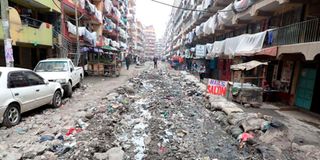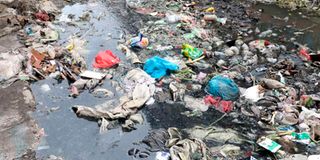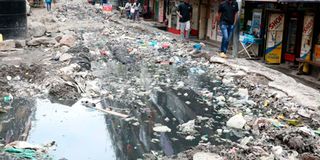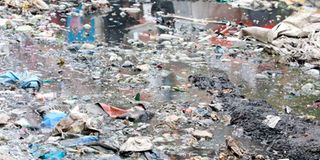Children of a lesser God? Pipeline estate continues to choke under garbage

Pipeline and Kware have been in the spotlight for the chaotic construction of residential buildings.
The air stinks of decomposing garbage mixed with underground sewage and uncollected waste that lies on the street between buildings in Pipeline estate.
Instead of accessible clean walk paths, residents have to play a game of hop, step and jump to reach their homes, because of the garbage that has taken up permanent residence on walkways.
To our right is a welding shop. One of the workers is busy spreading sand outside the shop to make the mushy ground somewhat passable.
“I have to do this so that my customers at least do not have a hard time reaching my shop. This costs me money, I have to buy the sand but if I do not do this I lose business,” Emmanuel Otieno said.
Most of the small-scale traders lined up selling their wares along the dirty street emulate Mr Otieno’s actions.

Efforts by the county government to formulate a plan for waste disposal, especially in estates, are yet to be seen.
At the entrance to the estate more sand is spread on the ground. One of the locals informs us they were filling up a hole.
Some even tried placing sacks of sand along the edge to serve as walk paths and control the waste from flooding their homes when it rains.
But this only works for a little while.
“When it rains, it's worse. The waste flows inside the houses and those living on the ground floor open the doors and are met with garbage waste floating around,” John Mutua said.
“If there are people who pray for no rain, then it is us. Because at least when it does not rain the waste is contained on the streets.”

Estates for low-income earners like Pipeline and Kware are the most affected, with residents complaining about being neglected.
Cheap housing
Mr Mutua has lived in the estate for the past three years. He says when he moved here he found the place exactly the way it is now.
The street is completely impassable by vehicles. It is a wonder how people from the estate transport their household items when relocating.
He blames the poor condition of the area on a growing population and poor drainage systems.
“I moved here because of the cheap housing, and because it is near where I work. We have tried to seek intervention from the local government for something to be done to no avail. The sewer system is also not good, most of the time the pipes would burst,” Mr Mutua said.
When Alice Mueni moved into the area, she said, the houses were mainly iron sheet structures. Eventually, concrete structures were built by land owners.
At the time, most of the houses were just two floors, but then landlords added more floors. Most residential houses have up to seven floors, with a few others reaching up to nine.
“It is a state we have been forced to live in. The situation is made worse by the locals themselves, who have now made it a dumping site,” Ms Mueni said.
Garbage collection continues to be a big problem in Nairobi. Efforts by the county government to formulate a plan for waste disposal, especially in estates, are yet to be seen. Most estates depend on the services of local youth initiatives with garbage collected from residential houses at a fee.

Garbage collection continues to be a big problem in Nairobi.
Undesignated areas
But with no clear dumping zones, sometimes the garbage collected ends up being dumped in undesignated areas.
Estates for low-income earners like Pipeline and Kware are the most affected, with residents complaining about being neglected.
Pipeline and Kware have been in the spotlight for the chaotic construction of residential buildings. Some of these structures have been marked by the county government as having been illegally erected and are unsafe for occupancy.
In 2018, the county government said it had set aside Sh20 million to build two transfer stations, where collected garbage is sorted to determine what will be reused or thrown away.
In 2021, another ambitious plan to contract street families to collect garbage in Nairobi was also proposed.





